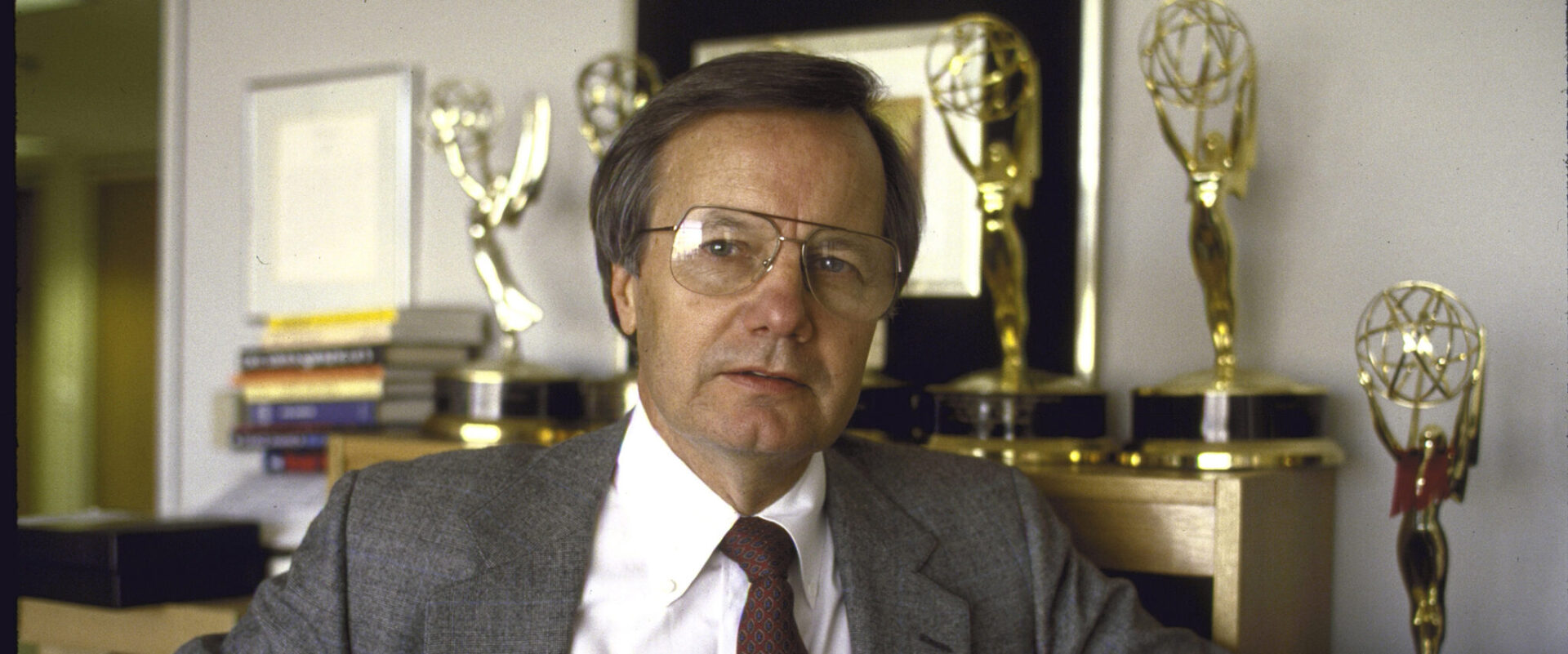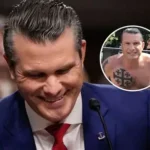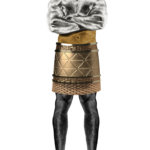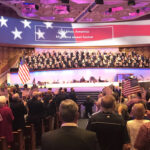When I saw the news of Bill Moyers dying, I felt all the oxygen left my office. Never has one person spoken more truth to power than Moyers.
The tributes to him are prodigious and well-deserving. I add here some personal perspective and other testimony that attempts to give a portrait of what it means to speak truth to power.
Growing up in the hills of North Louisiana among Baptist fundamentalists, I was sustained by the truthful witness of three men who grew up in my same “neck of the woods”: William McClendon, Will Campbell and Bill Moyers.
McClendon, a true anabaptist, wrote what for me is the definitive Baptist theology and has helped me keep the baptist vision clear for more than 70 years. Campbell, with his sermons, lectures and novels, has given me bread and wine for the difficult journey of living a progressive faith among Southern Baptists. Moyers has sustained by his commitment to the Social Gospel, the politics of Jesus and the role of government in providing the largest possible social safety net for the “least of these.”
I find it amazing that Marshall, Texas, Shreveport, La,, and Liberty, Mo., produced such giants in my midst. I shouldn’t be surprised because I believe God still raises up faithful voices to speak the truth to power as needed from the unlikeliest places.
And it is Moyers who has most inspired me.
“In all his roles, he was a fearless speaker of the truth.”
Moyers lived three lives in one: Baptist preacher, political adviser to presidents, and journalist. In my view, once a preacher always a preacher. What made Moyers a preacher for life was his commitment to truth. In all his roles, he was a fearless speaker of the truth.
Truth-telling preacher
The ancient Greeks had a word for a man like Moyers: parrhesia. Michel Foucault translates parrhesia as “free speech.” And the person engaging in free speech is called the parrhesiastes.
The person who uses parrhesia, says Foucault, “is someone who says everything he has in mind: he does not hide anything, but opens his heart and mind completely to other people through his discourse.”
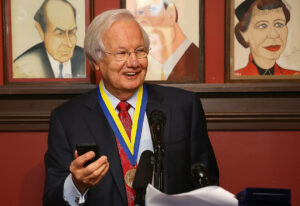
Parrhesia has four characteristics: Truth, risk, criticism and duty. Moyers knew his calling was to be a truth-seeking, truth-telling parrhesiastes. And, across multiple platforms, he earned the accolades of the wreath of honor. Moyers was the true parrhesiastes.
Moyers’ character and experiences remained true to his convictions. No forced manipulations. No faking the results. Straight-shooting, straight-talking truth-telling.
He takes his place as one of the great preachers of our time. His pulpit was not the high steeple church. He was not what Carlyle Marney dubbed the “blesser of a successful culture.” I find his sermonic repertoire to have more in common with the open-ended, light-soaked, truth-drenched parables of Jesus.
Moyers’ pulpit stood in the studios of the Public Broadcasting System. From his pulpit, Moyers reached as many as 30 million people. He was the original super mega-pastor to millions.
Truth-telling aide to a president
His career started on one of the darkest days in our nation’s history — the assassination of President John F. Kennedy. As Air Force One prepared to take Vice President Lyndon Johnson back to Washington, D.C., Moyers hurried up the steps at Love Field in Dallas. He handed a note to a Secret Service man who didn’t recognize him. “I’m here if you need me,” the note read. Then Moyers joined Vice President Johnson minutes before he was sworn in as the nation’s 36th president.
Moyers’ first task that day was to compose a statement for Johnson to deliver when they landed at Andrews Air Force Base. According to Robert Caro, Johnson biographer, Johnson told Moyers, Jack Valenti and Liz Carpenter: “I want you to put down something for me to say when we land. Nothing long. Make it brief.” The three Texans composed a draft. Moyers would be there every day for whatever President Johnson needed.
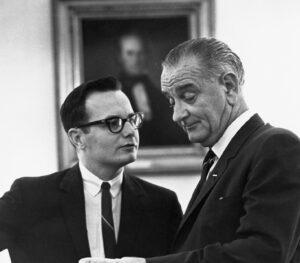
Moyers also was instrumental in carving out the Civil Rights bills of 1964, 1965 and 1966; helped formulate Johnson’s Great Society legislation, pushed through the PBS broadcasting bill of 1967, and played a major role in the establishment of the Peace Corps. He made the cover of Time magazine in October 1965 as “LBJ’s Young Man in Charge of Everything.”
After leaving the White House in 1966, Moyers became a journalist, but still a preacher. He remained an evangelist for progressive causes and a proponent of the government as part of the social politics of Jesus.
Truth-teller on PBS
According to Kyle Childress, pastor of Austin Heights Baptist Church in Nacogdoches, Texas, Moyers absorbed his commitment to social causes from ethics professor T.B. Maston at Southwestern Baptist Theological Seminary.
“Maston was a gentle man,” Childress writes, “who believed that to be ‘conservative’ about Jesus led to becoming ‘liberal’ on many social issues. Especially on race.” On June 29, 2025, Childress paid moving and powerful tribute to Moyers in his sermon, “Telling the Truth: The Witness of Bill Moyers.”
“Bill, tell the truth if you can, but if you can’t tell the truth, don’t tell a lie.”
Childress recounts Moyers’ story of going to work for Johnson: “When I became White House press secretary against my will, in 1965, my father, a Baptist deacon, sent me a telegram saying, ‘Bill, tell the truth if you can, but if you can’t tell the truth, don’t tell a lie.’ He had a fourth-grade education and was the most honest man I ever knew. I did my best to honor his wish.”
And Childress says: “And honor it he did. Bill was renowned as a journalist with integrity and honesty, who spoke truth to power. He was highly critical of journalism being bought out and bought off by big corporations and big money.”
As Moyers hammered home the truth about the dangers of autocracy, global warming, income inequality and the plague of racism, he continued to preach his heart and mind in full sermonic garb.
My all-time favorite story from Moyers came from his powerful PBS series with Joseph Campbell, the six episodes of Joseph Campbell and the Power of Myth. The show was one of the most popular TV series in the history of public television and continues to inspire new audiences.
Moyers, in his speech, relates the story from an aborigine tribe in Australia. The rite of passage to manhood included young boys being guided into the jungle in the darkness. They were left alone while the old men hid in the bush and waved bullroarers in the air. The sound produced by these instruments would make excellent background music for a horror film. The young boys are taught the bullroarer sounds are the voices of the spirit. On one such night, as a group of young boys huddled in terror in the darkness, one of the group said, “It’s just the old men trying to scare us.”
Moyers told the story to remind us how often our political leaders are prone to use the technique of the bullroarer to frighten the nation into ill-advised and intolerant action. He was, on this occasion, speaking of the rhetoric of President George Bush.
A prophet for our times
In what now sounds like prophetic insight, back in 2013, Moyers warned about dangers to American democracy on his own program Moyers & Company.
“We are so close to losing our democracy to the mercenary class, it’s as if we’re leaning way over the rim of the Grand Canyon and all that’s needed is a swift kick in the pants,” he said. “Look out below. The predators in Washington are only this far from monopoly control over government. They have bought the political system lock, stock and pork barrel, making change from within impossible. That’s the real joke.”
William Brangham, a PBS colleague of Moyers, testifies: “He was an enormous champion of public media and often said we need to keep reminding ourselves to put the public in public media.”
As we face a pronounced attack on public media in this country, we remember Moyers’ manta: “The only way we’re going to keep this democracy that we have got going is to have a feisty, free and robust core of journalists continuing to do their work day in and day out.”
The greatest tribute I can make is to testify that Bill Moyers would today be the penultimate anti-Trump voice. His life, ministry and work remain a thorn in the flesh of MAGA.
Moyers offers the prophetic voice opposed to the authoritarian impulses of President Trump. As more political power is ceded to one individual rather than our anchor institutions, democracy is endangered.
Trump and his MAGA minions are now engaged in a prodigious effort to dismantle the amazing contributions of Bill Moyers from civil rights, public broadcasting, America as servant to the nations, the First Amendment and the free press.
I have read and listened to the “sermons” of Moyers across his entire career. I never have read a word or heard a message that wasn’t true. His voice remains a needed corollary to the anti-democratic and anti-freedom rhetoric of recklessness and arbitrary power.
Moyers has left behind disciples determined to keep preaching his message to a confused and anxious national congregation. I am grateful to add my voice to the voice of our nation’s most prodigious and prolific parresiastes.
